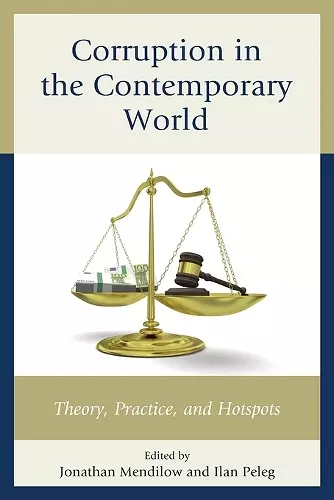Corruption in the Contemporary World
Theory, Practice, and Hotspots
Ilan Peleg editor Jonathan Mendilow editor
Format:Paperback
Publisher:Bloomsbury Publishing PLC
Published:28th Mar '17
Currently unavailable, and unfortunately no date known when it will be back

This book deals with large-scale, systemic corruption, a phenomenon that it identifies as part of the political landscape in most, if not all, societies of the contemporary world. While the analysis is grounded in the political thought of earlier thinkers, especially Edmund Burke, and integrates the insights of several modern analysts of corruption, the volume offers a new, updated theoretical perspective on the topic. This perspective reflects deep concerns with corruption in a world facing accelerated social transition, increased economic polarization, and growing distrust toward political elites in many countries.
This book approaches corrupt practices both theoretically and empirically, offering the perspectives of scholars who come to the topic from different traditions and cultures. It contains the collective efforts of members of the Research Committee on Political Finance and Public Corruption of the International Political Science Association. In formulating a comprehensive approach on corruption, the volume offers insights in regard to new developments in the United States, in Middle Eastern countries (especially in the wake of the Arab Spring), in several European counties (Austria, Italy, Spain), as well as in the People’s Republic of China. The analysis goes beyond the traditional legal definitions of corruption or purely economic views of it and focuses more broadly on institutional, cultural, and normative dimensions of this globally important phenomenon.
Corruption has for a long time been notoriously hard to define. What it is perceived to be is not necessarily what it is. It is congruous and sometimes fuses with notions such as extortion and redistribution of wealth or even welfare benefits. Can it be eradicated? Should it be embraced as an acceptable way of running political systems and institutions? These questions raise the intricate issue of the tenuous line which separates the political sphere from the economic or the public spheres.
The contributions gathered in this opus by Mendilow and Peleg take us on a journey to the heart of the matter: from Burke’s ideas to the reality on the ground, from ancient Greece to modern Italy, Austria, or China. We shall take a close look at the solemn workings of the U.S. Supreme Court as well as the successive waves of the Arab Spring which were backed by angry mobs. Very promising explorations indeed!
Corruption is liable to become an emotionally charged indicator of academic and public discourse in future global discussions, and this book promotes the issue of corruption to the very forefront of the global public debate. This book explores understanding the phenomenon of corruption, which could lead to constructive and successful actions being taken to combat, prevent, and understand corruption through the different cases of countries analyzed. This book should be a must read for all the public officials, business environments, academic representatives, students, NGOs, and all who want to dive into deep analyses and understanding of corruption phenomenon. -- Olga Guzhva, V.N. Karazin Kharkov National Univer
ISBN: 9780739194706
Dimensions: 230mm x 151mm x 21mm
Weight: 426g
280 pages